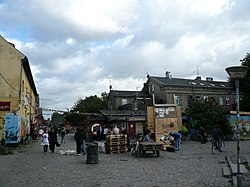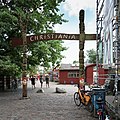Freetown Christiania
Freetown Christiania, commonly just called Christiania, is a Danish special community. The village is partially self-governing with 850 inhabitants, and has an area of 85 acres near the capital of Denmark, Copenhagen. The Freetown has often been in the centre of controversies since its creation in an empty military area in 1971. In the Freetown, cannabis was legal until 2004. Inhabitants of Christiania are called "Christianites". Christiania has become home to several businesses such as carpenters, blacksmiths, a bike shop, as well as several cafes, restaurants, jazz, blues and night clubs.
Freetown Christiania Fristaden Christiania | |
|---|---|
| Anthem: | |
 | |
| Location | Copenhagen, Denmark |
| Official languages | Danish |
| Government | Anarchist commune and partially autonomous intentional community |
| Establishment | |
• Declared | 1971 |
| Area | |
• Total | 0.07 km2 (0.027 sq mi) |
| Membership | ~1,000 |
| Currency | Danish Krone (de facto), Løn (de jure) |
| Time zone | UTC+1 |
Area protection
In 2007, the National Heritage Agency proposed protection status for some of military buildings, now in Christiania. These are:
- Den grå hal ('The grey hall')
- Den grønne hal ('The green hall'), originally a smaller riding house
- Mælkebøtten ('The dandelion')
- The Commander's house
- The 17th and 18th century powder magazines on the bastions.
The birth of Christiania
After the military had left, the area was only guarded by a few watchmen and occasionally homeless people went in the area for sleep or for living there. On 4 September, 1971, residents of the area broke down a wall for making a place where their children could play. On 26 September, 1971, Christiania was opened to people by Jacob Ludvigsen, a well-known provo and journalist who published a magazine called Hovedbladet ('The main paper'). In the paper, Ludvigsen wrote an article in which he and five others went on exploration into what he called 'The Forbidden City of the Military'. The spirit of Christiania quickly developed into one of the hippie movement, the squatter movement, collectivism and anarchism, in contrast to the site's previous military use.
The Community
Meditation and yoga have always been popular activities for the Christianites, and for many years Christiania had their own internationally acclaimed theater group Solvognen, who, beyond their theater performances, also staged many happenings in Copenhagen and even throughout Sweden. Ludvigsen had always talked about drugs, hard drugs (now are illegal in Christiania) and soft drugs. The "problem" of drugs made Christiania really famous, and the most know part of the Freetown. The neighbourhood of the Freetown is accessible through many entrances and cars are not allowed. Danish authorities have repeatedly removed the large stones blocking the main entrance claiming they need access to the area for fire trucks and ambulances in the event of a fire or medical emergency, yet the residents respond by placing them back each time as they feel attacks by the authorities. The people in Christiania have developed many laws without the Danish government. The rules forbid stealing, violence, guns, knives, bulletproof and hard drugs. A famous street in the Freetown is known as Pusher Street, where hash and Skunk weed were sold openly from permanent stands until 2004, it nevertheless does have rules forbidding hard drugs, such as cocaine, speed, ecstasy and heroin. The commerce is not really clean, but since the rules require a consensus they cannot be removed unless everybody agrees. The Since 1994, residents have paid taxes and fees for water, electricity, trash disposal, etc. The future of the area remains in doubt. In the street photos are forbidden.
Important pieces of the Freetown's History
2005 shooting and murder
On April 24, 2005, a 26-year-old Christiania resident was killed and three other residents injured in a violent gang assassination on Pusher Street. The reason for this was a fight between few Christianites and people from the hash market of Copenhagen.
Riots after demolition of house
On May 14, 2007 workers from the governmental Forest and Nature Agency with help from the police, entered Christiania to destroy the abandoned building of Cigarkassen ('the cigar box'). They were met by angry and scared Christianites who feared that the police were going to demolish other houses too. Road blocks were built and the trucks were sabotaged so that they could not move. After the police then entered the Freetown and Christianites attacked the policemen with fireworks and stones, and built barricades in the street outside Christiania gate. The police used tear gas on the people. The police later had to retreat from Christiania. The riot continued over night. At the entrances the Christianites bombarded the police with stones and Molotov cocktails forcing them to retreat. More than 50 Christiania activists and rioters from outside were arrested.
Gay house
Since the 1970s the Gay House (Bøssehuset), one of Christiania's autonomous institutions, had been a centre for gay activism, parties and theatre. The house was very famous in Denmark for humorist and artistic variety shows, and became a meeting point for all homosexuals in Copenhagen. During the 1980s and 1990s the original pioneers aging and some deceased, the house was left with little activity which was not revived until the early 2000s, when a group of young gay performers and activists, Dunst, were invited to take over the house so it could remain a centre for gay creativity. However, after 9 months they were asked to leave Christiania again. Primarily due to noise complaints. According to Dunst, neighbors would never readily accept them and the newcomers were accused of not understanding "the Christiania lifestyle" despite Dunst claim that they introduced a democratic management form and established open workshops for photography, art, music, dance, video. In 2004 Dunst participated in 'Christiania Distortion' (an event supported by Christiania) in a bus circling around the Freetown.
A biker gang in the Freetown
Around 1984 a biker gang had arrived in Christiania and conquered a part of the hash market. Violence on the premises increased at this period and many Christianites felt unsafe and unhappy with the new residents. This resulted in sabotage acts directed towards the bikers as well as the publication of several provocative manuscripts urging the Christianites to throw out the powerful and armed bikers. This tension culminated when the police found a murdered individual who had been sliced to pieces and buried beneath the floor of a building. Christiania reacted with two colossal community meetings—one outside the building—where it was agreed that the bikers had to leave. They did, and have never returned.
Cars in the Freetown
In Christiania cars are prohibited. However, 132 cars are owned by residents and need to be parked on the streets near the Freetown. In 2005, a parking space for only 14 cars outside the Freetown was created. In 2001 a few residents in one of Christiania's sections proposed to construct a parking lot for their cars which was rejected by other Christiania residents.
Drugs
Since its opening, Christiania has been famous for its open cannabis trade, taking place in the famous central street called 'Pusher Street' - now Green Zone. Since 2003, however, the 'officially' open hash trade has been ended by authorities. However, cannabis is still sold in the Freetown. Hard drugs, including heroin and cocaine, have been banned from Christiania since 1979 by the community's own rules.
Governmental measures
In January 2006, the government proposed that Christiania would be turned into a mixed alternative community and residential area adding condominiums for 400 new residents. Current residents, now paying DKK 1450 (USD 250) per month, would be allowed to remain but need to begin paying normal rent for the facilities. Christiania has rejected this, fearing the Freetown would turn into a normal Copenhagen neighborhood. In particular, the concept of privately owned dwellings is claimed to be incompatible with Christiania's collective ownership.
Architectural competition
In order to present a reasonable use of area after an eventual "cleaning", the Danish government commissioned an architectural competition. 17 proposals were received, of which only eight have met the formal competition requirements. All of the proposals were rejected by ojudges. The cost of the architectural competition was 850,000 Danish Kroner (113,000 Euro, 145,000 USD).
Freetown Christiania Media
Christiania, seen from the spire of the Church of Our Saviour, September 2003
Related pages
Other websites
- Christiania you have my Heart Archived 2007-12-24 at the Wayback Machine, Documentary 1991 (google video)
- Danish Palaces and Properties Agency about Christiania Archived 2008-12-21 at the Wayback Machine
- Loppen - Rock and blues venue in Christiania
- Article about Christiania Archived 2008-07-18 at the Wayback Machine, The Independent (UK), May 31, 2007.







